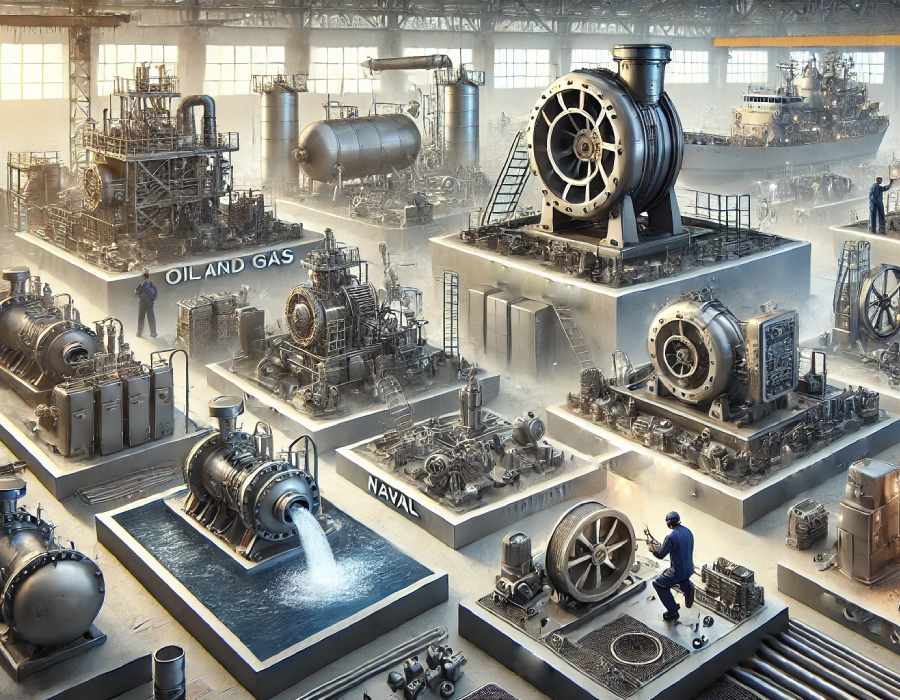Industrial applications of Centrifugal pumps are essential across various industries due to their efficiency and reliability in handling and transporting liquids. At Asimer Group, we specialize in CNC machining and TIG welding of industrial pumps and valves, ensuring that these components operate with maximum CNC machining accuracy and durability. This article explores centrifugal pump applications in six key sectors: Oil and Gas, Naval, Petrochemical, Water Treatment, Cryogenics, and Desalination, highlighting how our CNC machining and welding capabilities add value and efficiency for our customers.
Main industries and applications of centrifugal pumps
Oil and gas
Application overview
Centrifugal pumps play a crucial role in the oil refining industry for transporting crude, petroleum products, and sludge handling on platforms and in refineries. These pumps operate in highly corrosive environments, managing viscous liquids with suspended solids, requiring consistent, durable performance.
Centrifugal pumps’ specific requirements
- High resistance to abrasion and corrosion: The transported liquids may contain abrasive particles and be highly corrosive, requiring robust materials.
- Ability to handle viscous liquids: Pumps must maintain efficient performance even with high-viscosity liquids and solids.
- Fittings in Oil and Gas: Essential to ensure secure, leak-free connections in complex systems.
Machining and welding in Oil and gas
At Asimer Group, we actively participate in developing critical components for centrifugal pumps used in oil refining. Our precision machining is essential to ensure each part meets the stringent tolerances required in the oil and gas industry. This process includes milling and turning operations, ensuring dimensional integrity of parts subjected to high pressures and extreme temperatures. Our TIG welding expertise complements machining by ensuring durable, resistant joints, ideal for the highly corrosive and abrasive conditions typical in these environments.
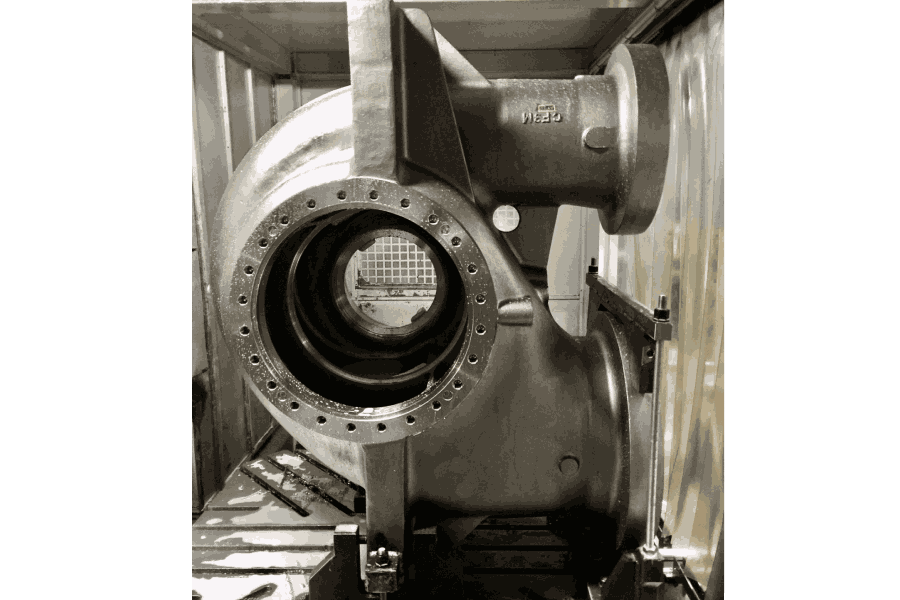
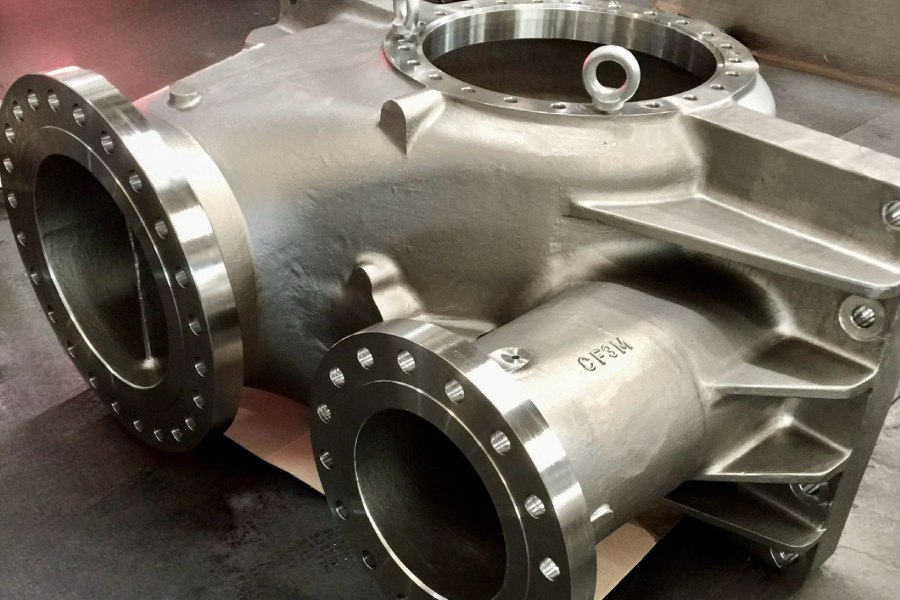
Naval
Application overview
In the Naval sector, centrifugal pumps are used in propulsion systems, onboard water handling, and cooling systems on vessels. These pumps must operate reliably in corrosive marine environments and adapt to confined spaces.
Centrifugal pumps’ specific requirements
- Reliable operation in marine environments: Continuous exposure to saltwater and humidity requires materials highly resistant to corrosion.
- Compact and efficient design: Limited space on vessels demands pumps designed to maximize performance in tight spaces.
Machining and welding in naval
At Asimer Group, we engage in machining and welding projects specifically designed for the naval sector’s needs. Our Trevisan machining centers enable us to offer high-precision solutions, ensuring that pump components meet the stringent standards of resistance and efficiency required in this industry.
We complement this process with automated MIG welding, optimizing manufacturing efficiency for components designed for high reliability in compact spaces. Additionally, we apply TIG welding for joints requiring greater precision and high-quality finishes, ensuring durability in extreme conditions common in naval applications.
Petrochemical
Application overview
Centrifugal pumps in the petrochemical industry are essential for reaction, mixing, and transport of chemical products. These pumps must handle highly corrosive substances and reactants safely and efficiently.
Centrifugal pumps’ specific requirements
- Corrosion-resistant materials: Pumps must be built with materials that do not react with the chemicals handled.
- Leak-proof seals: Preventing leaks is crucial for process integrity and safety.
Machining and welding in petrochemical
At Asimer Group, we work closely with the petrochemical industry to develop custom CNC-machined components tailored to handling corrosive chemicals. Our TIG welding techniques ensure sealing and safety in operations.
Alongside TIG welding, we use MIG welding in projects that require high resistance and durability for thicker material joints or applications requiring speed without compromising quality.
We also utilize advanced measuring instruments at each process stage to ensure that components meet the highest standards of quality and precision.
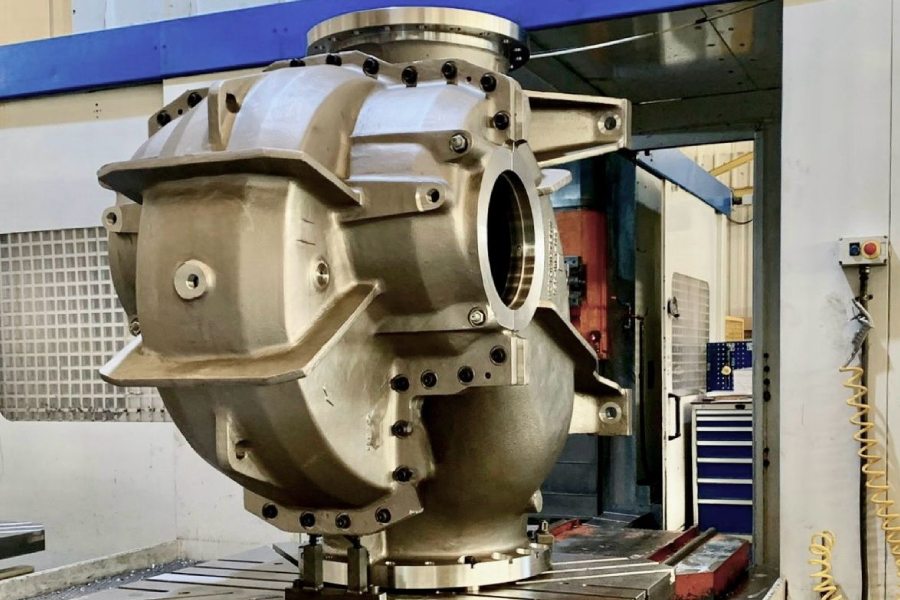
Water Treatment
Application overview
Centrifugal pumps are essential in water treatment plants, where they are used to circulate and transport water in purification and distribution processes. These pumps must handle large water volumes with high energy efficiency and resistance to suspended solids.
Centrifugal pumps’ specific requirements
- Corrosion resistance: Water may contain corrosive elements requiring resistant materials.
- Handling of suspended solids: Pumps must operate efficiently even with particles in the water.
- Energy efficiency: Optimizing energy consumption is crucial to handle large volumes of water sustainably.
Machining and welding in water treatment
At Asimer Group, we specialize in offering precise, efficient solutions for the water treatment sector, where component reliability and durability are essential. Our CNC machining capabilities allow us to manufacture critical parts with extremely tight tolerances, ensuring optimal performance and reduced maintenance in centrifugal pumps used in this sector. Using specialized, corrosion-resistant materials such as stainless steels and advanced alloys guarantees that components withstand the harsh conditions during water transport, which may contain chemicals or corrosive particles.
Our precision machining not only ensures perfect fitment but also maximizes pump energy efficiency by reducing energy losses from friction or component misalignments.
We also apply TIG welding to ensure clean, robust joints, ideal for environments where pump components must withstand both water pressure and continuous exposure to corrosive elements. TIG welding is particularly suitable for ensuring the integrity of contact surfaces that require high precision and defect-free finishes, essential for longevity and performance in water treatment environments. This combination of high-precision machining and specialized welding allows our customer to optimize the operation of their pumping systems, ensuring greater operational efficiency and prolonged equipment life.
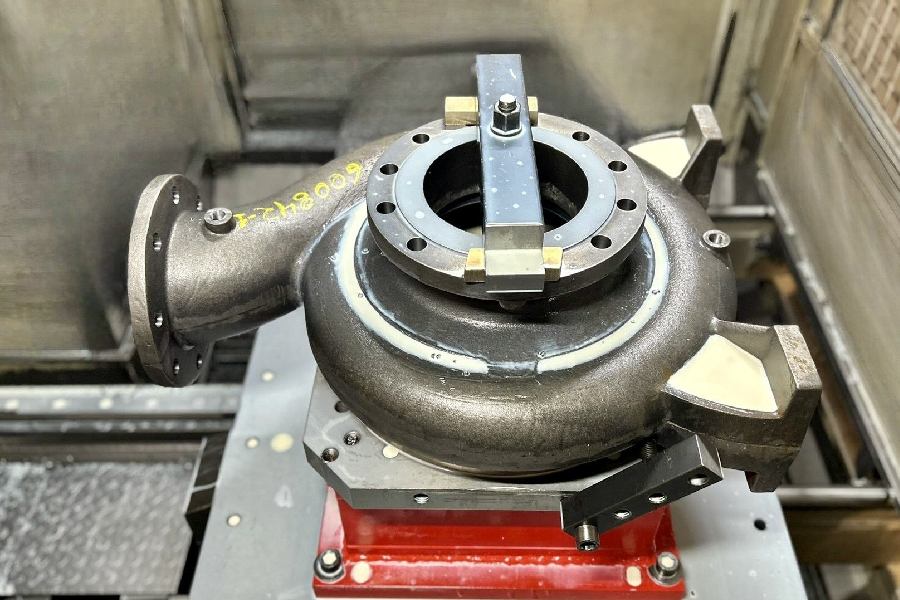
Cryogenics
Application overview
In cryogenic applications, centrifugal pumps are used to handle and transfer liquids at very low temperatures, such as liquid nitrogen, oxygen, and helium. These pumps must operate efficiently without compromising the liquid’s integrity during pumping, ensuring safe, precise handling of cryogenic fluids.
Centrifugal pumps’ specific requirements
- Hermetic design: Pumps must prevent bubble formation during pumping, which is essential to maintain system efficiency and avoid cavitation that could damage components.
- Materials that retain integrity at low temperatures: Materials used in the pumps must withstand extremely low temperatures without becoming brittle or losing mechanical properties, ensuring stable, safe operation.
Machining and welding in cryogenics
Our CNC machining ensures that parts meet strict tolerances, crucial to prevent deformations or efficiency losses in systems operating at extremely low temperatures. We use materials like high-purity stainless steel and special alloys, specifically chosen for their ability to maintain properties at cryogenic temperatures.
Besides TIG welding, we also use plasma-transferred arc (PTA) welding in applications requiring higher material deposition control and greater resistance to corrosion and wear in extreme environments. PTA welding is ideal for reinforcing critical surfaces in components exposed to cryogenics, ensuring a uniform finish and superior durability. This technique complements our welding capabilities to ensure reliable, long-lasting performance in low-temperature operating conditions.
Desalination
Application overview
In desalination plants, centrifugal pumps are crucial for reverse osmosis processes, where saltwater is subjected to high pressure to remove salts and other contaminants, turning it into potable water. This process requires pumps to operate under extreme conditions, such as handling large volumes of water, with energy efficiency and exceptional resistance to the corrosive effects of saltwater.
Centrifugal pumps’ specific requirements
- High resistance to saltwater corrosion: Saltwater is highly corrosive, especially in prolonged contact with metal surfaces. To prevent premature pump degradation, materials like stainless steels, duplex alloys, and special coatings that resist corrosion effectively over the long term are essential.
- Capacity to handle large water volumes: Pumps must manage massive water flows without compromising the desalination process’s efficiency. This implies that parts and components must be precisely designed and manufactured to minimize energy losses and maximize system performance.
- Energy efficiency: Given the high energy consumption of reverse osmosis, pumps should be optimized for the lowest possible energy use while maintaining the necessary pressure for optimal performance.
Machining and welding in desalination
We provide key solutions for technical challenges in desalination plants through:
- High-precision CNC machining: We machine critical pump components such as impellers, shafts, and casings using state-of-the-art CNC equipment. This process allows us to meet strict dimensional tolerances and achieve high-quality surface finishes, essential for reducing friction and increasing pump efficiency. We also work with materials specifically chosen for corrosion resistance, such as duplex and super duplex stainless steels, ideal for saline environments.
- Specialized TIG welding: TIG welding is ideal for assembling pump components that operate in corrosive environments. At Asimer Group, we use this technique to ensure durable, corrosion-resistant joints, critical for parts under pressure and constant saltwater flow. This technique allows us to create smooth finishes in joints, reducing wear points and prolonging component life.
- Optimized corrosion-resistant materials: With our sector expertise, we advise customers on advanced materials for pumps used in desalination plants. We work with special alloys that resist corrosion and withstand the high stresses endured by pumps during reverse osmosis, ensuring efficient, long-lasting operation.
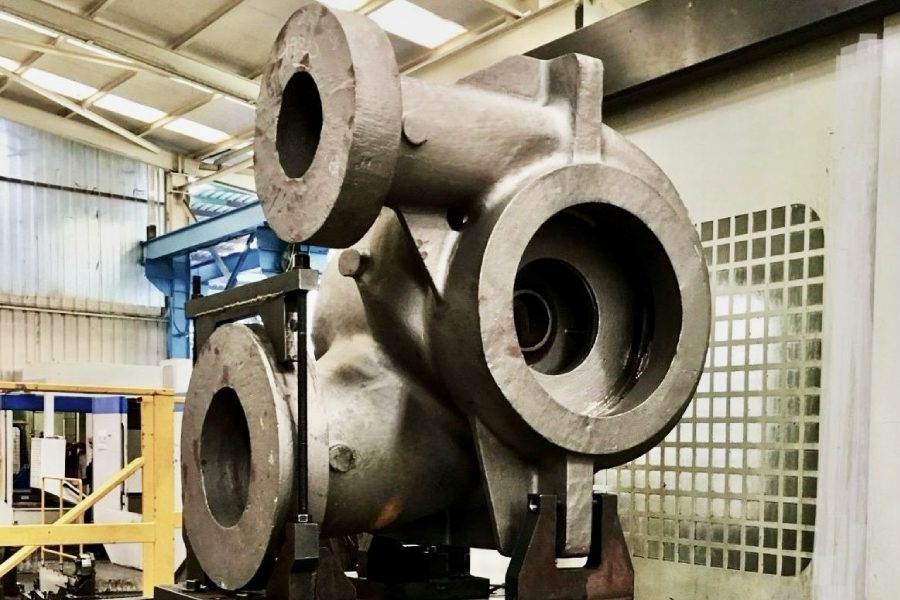
Technical requirements and specifications for each application
To guarantee component quality, we also apply non-destructive testing, verifying structural integrity before installation in critical systems.
Each industry has specific technical requirements that must be considered when designing and manufacturing centrifugal pumps. Below are the key aspects:
Flow and pressure
Each application requires specific flow and pressure levels that must be met precisely. We adapt component designs to meet flow and pressure specifications without compromising efficiency.
Construction materials
Selecting appropriate materials is crucial. Depending on the liquid’s nature being pumped, materials are chosen to resist corrosion, abrasion, and other specific conditions, including using special alloys for demanding applications.
Energy efficiency
Minimizing energy consumption is a fundamental goal. We optimize components to reduce energy losses and apply energy-saving technologies, such as efficient motors and advanced control systems.
Maintenance and durability
Centrifugal pump components are designed for easy maintenance, allowing simple access to critical parts for preventive and corrective maintenance. Additionally, our TIG welding and CNC machining techniques improve durability and reduce the need for frequent replacements.
Innovations and emerging technologies in centrifugal pumps
The advancement of Industry 4.0 has enabled the integration of smart monitoring and control technologies in industrial pumps. These innovations allow predictive maintenance and improve pump energy efficiency, reducing downtime and extending equipment life.
At Asimer Group, we are committed to incorporating advanced CNC technology and engineering solutions into the projects we develop, providing added value to our customers through cutting-edge technologies.
Conclusion
Centrifugal pumps play a key role in various industrial applications, from transporting crude oil in the Oil and Gas industry to handling cryogenic liquids at low temperatures. At Asimer Group, we understand each sector’s specific needs and offer advanced CNC machining and welding solutions that ensure optimal performance and extended durability. Our commitment to energy efficiency, precision manufacturing, and the implementation of emerging technologies positions us as a strategic partner for various industries. If you need to improve your pumping systems’ efficiency and reliability, contact us for specialized advice and tailored solutions.
Frequently asked questions (FAQs)
What is a valve and why is it important in pumping systems?
A valve is a device that regulates, directs, or controls the flow of a fluid (gases, liquids, or fluid solids) by opening, closing, or partially obstructing passageways. Industrial valves are essential in pumping systems as they allow flow and pressure control to optimize the operation of industrial pumps.
How do suspended solids affect centrifugal pumps?
Suspended solids can increase wear on centrifugal pumps, reducing their lifespan and efficiency. In applications like water treatment, selecting pumps with abrasion-resistant materials and an optimized design to handle these solids is crucial to maintaining operation.
What is CNC machining, and how does it improve pump performance?
CNC (Computer Numerical Control) machining allows the precise manufacturing of pump components, ensuring that parts meet strict quality standards and optimizing pump performance. This is particularly important in industries where reliability and efficiency are critical.
What are non-destructive tests, and why are they important?
Non-destructive tests are inspections carried out on components without damaging them, allowing structural integrity and quality verification without compromising functionality. At Asimer Group, we use these tests to ensure each component meets the highest standards before installation in critical systems.
What is the importance of energy efficiency in industrial pumps?
Energy efficiency is crucial for reducing operational costs and environmental impact. Pumps with optimized designs can handle large liquid volumes using less energy, resulting in lower resource consumption and reduced expenses.

